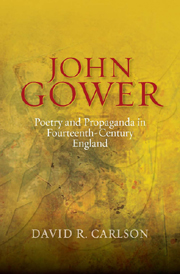Book contents
- Frontmatter
- Contents
- Abbreviations and Citation Forms
- Introduction: Gower in History
- I Fourteenth-Century Panegyric Verse and Official Writing
- 1 Official Verse: The Sources and Problems of Evidence
- 2 The State Propaganda
- 3 Occasions of State and Propagandistic Verse in Mid-Century
- 4 Walter Peterborough's Victoria belli in Hispania (1367) and its Official Source
- 5 Compulsion in Richard Maidstone's Concordia (1392)
- II Gower's State-Official Late Poetry
- Bibliography
- Index
- VOLUMES ALREADY PUBLISHED
3 - Occasions of State and Propagandistic Verse in Mid-Century
from I - Fourteenth-Century Panegyric Verse and Official Writing
Published online by Cambridge University Press: 05 February 2013
- Frontmatter
- Contents
- Abbreviations and Citation Forms
- Introduction: Gower in History
- I Fourteenth-Century Panegyric Verse and Official Writing
- 1 Official Verse: The Sources and Problems of Evidence
- 2 The State Propaganda
- 3 Occasions of State and Propagandistic Verse in Mid-Century
- 4 Walter Peterborough's Victoria belli in Hispania (1367) and its Official Source
- 5 Compulsion in Richard Maidstone's Concordia (1392)
- II Gower's State-Official Late Poetry
- Bibliography
- Index
- VOLUMES ALREADY PUBLISHED
Summary
Official documents, memoranda, proclamations, and especially the ubiquitous but evasive newsletters, state-sponsored in production and recirculation; a prose pamphlet-literature too, now mostly lost, partisan though not clearly if ever directly state-sponsored, in some cases at least connected to writing in state-sponsored recirculation (demonstrating access by drawing on official records and documents), with polemical purposes identifiable with state-purposes; so much is attested by the surviving prose literature: the documents and newsletters themselves, in the sometimes indirect forms in which they are now known; the greater newsletter-like writings, or lesser chronicle-like polemical writings, pamphlets themselves possibly in some cases; and then such grander chronicle-histories as that of Henry Knighton.
There was poetry too, unequivocally as partisan as anything in Favent or Avesbury, likewise sometimes too serving propagandistic purposes of interest to a secular state, as in the cases of the two Bannockburn anonymi. What is lacking for the middle decades of the English fourteenth century is evidence of interconnection between the secular state's propaganda programme and the surviving verse performances – be it the sort of external and internal evidence obtaining in the Baston case, or conjunctural evidence, of use of official materials in state-sponsored circulation on the part of writers not otherwise known (by the internal or external evidence) to have had official sponsorship. Such interconnection as can be suspected may in fact have operated. In view of the logic of the state's military-financial situation and its efforts at propagating suasions to support its war-efforts, not to mention other more transient exigencies, it must be likely that poets were used – in other words, that poets and state were connected already.
- Type
- Chapter
- Information
- Publisher: Boydell & BrewerPrint publication year: 2012



